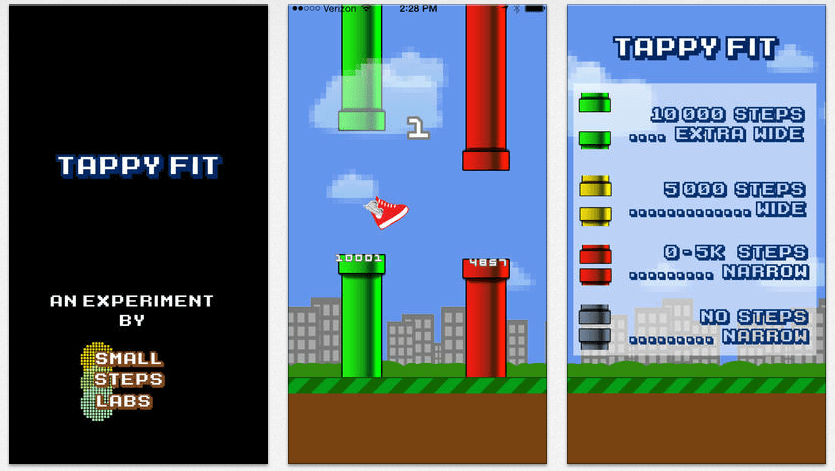A new game out now on the App Store features mechanics virtually identical to those found in viral hit Flappy Bird, but with a key twist – the game can be made easier through sheer physical effort. Using the Fitbit API, developer Aaron Coleman built-in a variable difficulty engine that allows you to redeem steps counted during a day in exchange for in-game rewards, like wider gaps between the pipes you have to navigate your bird avatar through.
Besides being yet another in a sea of Flappy Bird clones, Tappy Fit is also an interesting take on what developers can do with the new fitness APIs being made available to them by companies like Fitbit, Nike, Jawbone and more. And specifically in the realm of gaming, there’s a lot of potential for future integrations.
Coleman says Flappy Bird was a target not just because of its high profile – it’s more about the bad rap that the casual game got from a lot of circles.
“The genre reportedly produced some addictive and negative impacts on lives,” he explained in an interview. “The idea came after thinking about how we might reframe it as positive for health. [It took] just a few days to develop, started with an open source project and then we adapted it.”
The idea behind Tappy Fit isn’t to just offer up points for points’ sake, despite the fact that doing that seems to have driven a lot of engagement for Flappy Bird. Instead, Coleman and his Small Steps Labs startup are looking at how they might be able to create a foundational experience that can offer more than just fleeting, superficial reward.
“Points for points sake isn’t something we’re interested in,” Coleman said. “Combining things people value with their long-term health habits is very interesting to us. In the case of Tappy Fit, if you enjoy quick gaming moments, then making you more successful in the game because you were more successful meeting your step goal is something we see as an example of a meaningful tie in to your life.”
As for how original this project is, Coleman notes that while there are lots of games that track your fitness and are designed to gamify workouts, this is the only example he can think of that uses your sum total movement over a certain period to influence gameplay after the fact. Coleman previously developed a calorie-tracking game for kids called Food Buster that won Michelle Obama’s “Let’s Move” app challenge popularity contest in 2010, so he’s been thinking about how to yoke health and gaming together for a while now.
Join 10k+ tech and VC leaders for growth and connections at Disrupt 2025
Netflix, Box, a16z, ElevenLabs, Wayve, Hugging Face, Elad Gil, Vinod Khosla — just some of the 250+ heavy hitters leading 200+ sessions designed to deliver the insights that fuel startup growth and sharpen your edge. Don’t miss the 20th anniversary of TechCrunch, and a chance to learn from the top voices in tech. Grab your ticket before doors open to save up to $444.
Join 10k+ tech and VC leaders for growth and connections at Disrupt 2025
Netflix, Box, a16z, ElevenLabs, Wayve, Hugging Face, Elad Gil, Vinod Khosla — just some of the 250+ heavy hitters leading 200+ sessions designed to deliver the insights that fuel startup growth and sharpen your edge. Don’t miss a chance to learn from the top voices in tech. Grab your ticket before doors open to save up to $444.
“There is plenty of literature that suggests keeping people mindful of their daily physical activity level makes them more likely to increase it,” he said, describing why he thinks there’s more opportunity here. “There are also lots of ‘health games’ meant to be played at the gym, during a run, or in front of a screen. The Wii Fit and XBox Kinect for example engage you in the moment.”
Tappy Fit is an experiment, one meant to see what kind of experiences are possible on top of fitness data, and Coleman says we’re just beginning to see the tip of that particular iceberg.


